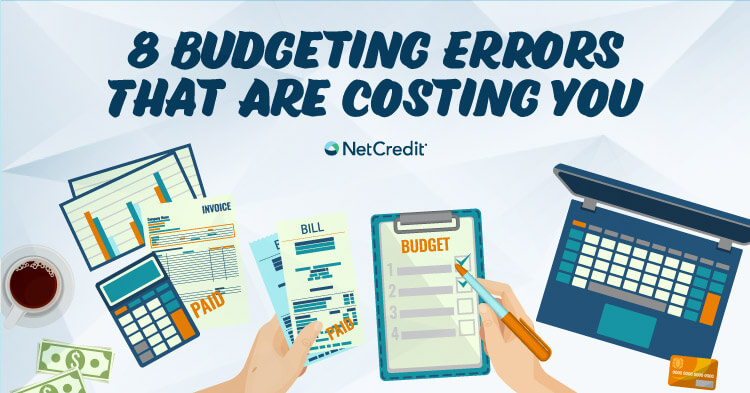Managing a budget is difficult if you’re not making progress and seeing the results you want. After all, why put in the effort to track your expenses and create a financial plan if it doesn’t make an impact?
In reality, your budget doesn’t limit you — it enables you to live the life you really want. Think of it an essential tool that helps plan your finances.
Not seeing the desired results with your current budget? We’ll cover eight of the most common budgeting mistakes that can cost you, and what to do to avoid them.
1. Your Emergency Fund Is Insufficient (Or Nonexistent)
You’ve probably heard it many times before: Save money for emergencies, unexpected expenses and a potential loss of income.
Building an emergency fund is one of the most fundamental personal finance rules you can follow. Your emergency fund can be a budget buffer that prevents you from going in the red or falling behind on payments. If your emergency fund is insufficient, you’ll spend more money to borrow money when the need occurs.
Your emergency fund is ideally easy to access and ample enough to help support you in case of job loss. While it may seem steep, most personal finance experts recommend aiming for roughly three to six months’ worth of living expenses. If you don’t have an emergency fund at all, start with a goal of $500 to $1,000, and build it up from there.
2. You Don’t Leave Room for Fun in Your Budget
An unrealistic budget without any wiggle room for small rewards or entertainment isn’t going to help you in the long run. There may be times when you need to save every extra penny to meet a financial goal or quickly pay down debt, but most of the time, it’s better to budget for small rewards and entertainment.
While it may seem counterintuitive, extreme budgeting for extended time periods can take its toll on your patience and willpower. Rewarding yourself once in a while with a small purchase or experience can be incredibly motivating, but it’s important not to go overboard and ruin your budget.
3. You Don’t Review and Adjust Your Finances
Starting a budget is just like learning a new skill — the more you practice, the better you are at managing and planning your finances. When you’re just starting to follow a budget, it might feel like trial and error until you find the right formula that helps meet your goals. Sometimes, what seemed like a good strategy before might not be worth practicing in the future.
When you grow more accustomed a frugal lifestyle, it starts to feel less like limiting yourself or cutting back and a lot more like you’re making smart choices. If you haven’t sat down and reviewed your budget and savings plan more than a few months, take the opportunity to do so now.
4. You’re Not Maximizing Your Tax Returns
You might be able to get a bigger tax return or offset any tax payment by using the appropriate tax deductions or credits available to you. For example, if you looked for a job or continued your education in the past year, you may be able to offset expenses when it comes time to file your return.
5. You Don’t Prioritize Your Goals
It’s easy to lose track of long-term goals when managing your busy day-to-day life. After all, you don’t have a specific plan or savings goal other than simply living within your means.
In reality, budgeting with specific, measurable goals in mind can motivate you to reach them. Prioritizing goals can also help determine how long or at what rate you’ll need to save for them. For example, research the estimated amount of money you’ll need to retire comfortably, and work towards that.
6. You’re Not Growing Your Savings
While it’s a good idea to keep your money safe in an FDIC-insured account, most standard checking and savings accounts don’t provide any interest (or hardly any interest) on your money. Instead, use a high-interest savings account for a better return on your money while it’s safe in the bank and still relatively easy to access. These types of accounts are available online and at some brick-and-mortar financial institutions.
7. Not Planning for Seasonal Expenses
Seasonal expenses that aren’t part of your budget will come to you as a surprise. Quarterly, annual or other sporadic expenses can be hard to manage if you don’t have extra wiggle room or money saved for a rainy day. While you may not be able to plan for all seasonal expenses, the following list gives an idea of some irregular and seasonal expenses to consider in your budget:
- Insurance payments
- Car and home repairs or winterization
- School expenses
- Summer vacation, camp or entertainment for the kids
Make a note of any additional seasonal expense you encounter that’s not already in your budget so you can plan for them in the future.
8. You’re Working at It Alone
Following a budget and working towards your financial goals should be a coordinated effort. If you have a family, your whole unit should be on board with your financial plan. If you’re single, surrounding yourself with like-minded, frugal friends can help keep you on track to meet your goals.
The information in this article is provided for educational and informational purposes only, without any express or implied warranty of any kind, including warranties of accuracy, completeness or fitness for any particular purpose. The information in this article is not intended to be and does not constitute financial, legal or any other advice. The information in this article is general in nature and is not specific to you the user or anyone else.






